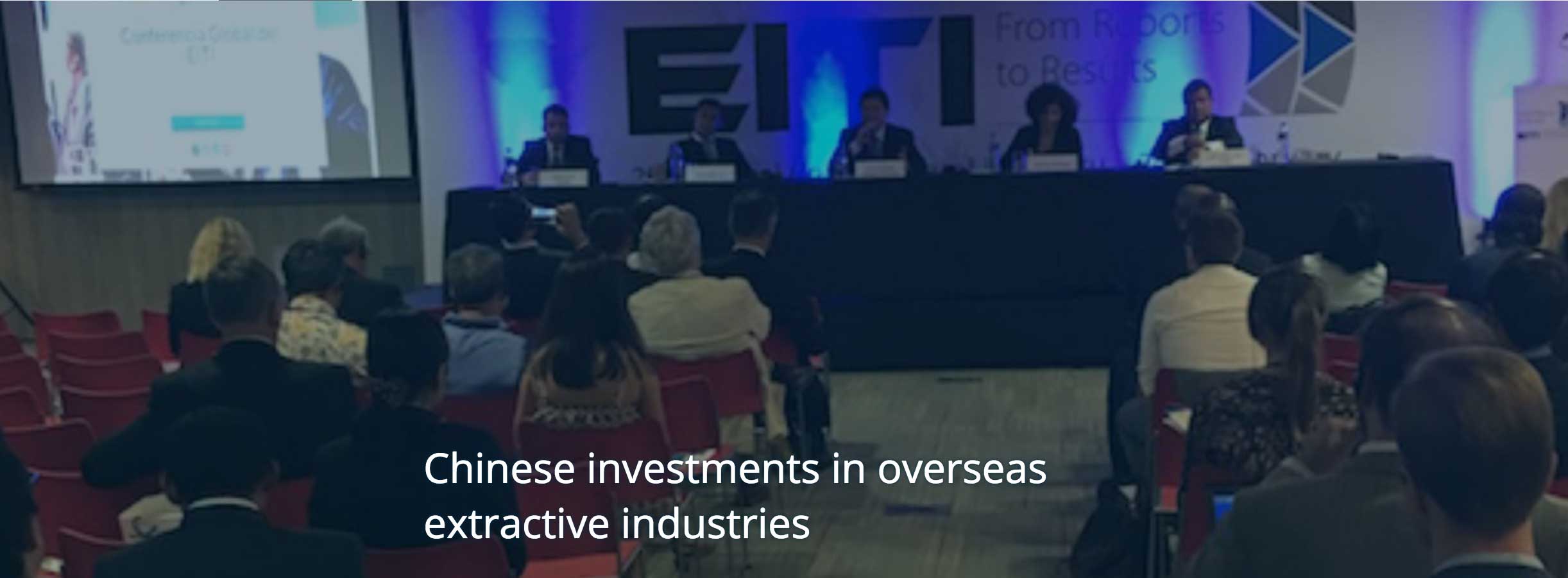
Stakeholders from host governments, civil society and Chinese companies met at the 7th EITI Global Conference.
Dragon, unveiled
On the first day of the 7th EITI Global Conference, a group of representatives from governments hosting Chinese extractives investments, civil society and Chinese companies met to discuss the emerging frameworks for Chinese extractive companies’ reporting is affecting their social license to operate.
Chinese foreign direct investment (FDI) reached USD 116 billion in 2014 according to UNCTAD figures, of which roughly a quarter was in the extractive industries. Despite the sharp contraction in outbound investment in 2015, China is set to overtake the United States and Hong Kong (through which much Chinese FDI already transits) as the world’s largest holder of FDI stock by 2020, according to forecasts from HSBC.
“Chinese-Peruvian investment relations have evolved significantly,” said Guillermo Shinno Huamaní, Peru’s Vice-Minister of Mines. “While management and labour challenges caused a poor popular perception of Chinese investors, more recent Chinese investors have worked with government and civil society to ensure good relations with local communities.”
Complimentary frameworks
Chinese government policy on Chinese companies’ social responsibility has evolved swiftly over the past decade. The 2005 annual meeting of the National People’s Congress endorsed the need for Chinese companies to incorporate social responsibility when developing overseas investment strategies, a requirement enshrined in Chinese company law in 2006.
In October 2014, the Chinese Chamber of Commerce of Metals, Minerals and Chemicals Importers and Exporters (CCCMC), under supervision of the Ministry of Commerce, issued Guidelines for Social Responsibility in Outbound Mining Operations. The guidelines cover a broad range of operational conduct including organisational governance, fair operating practice, value chain management, human rights, labour issues, environment as well as community involvement and engagement. As part of fair operating practices, the EITI is cited as the global standard for revenue transparency with which all companies operating in implementing jurisdictions must comply.
“The core of the CCCMC Guidelines is similar to the EITI,” said Sun Lihui, Director of CCCMC’s Liaison Department. “For example, under the Guidelines, Chinese companies are required to develop compliance and integrity systems to prevent and control bribery and other forms of corruption, including publishing all payments to government.”
Listed Chinese companies are also required to comply with stock exchange disclosure requirements. Aside from home-country frameworks such as the US Dodd-Frank Act and the EU Accounting and Transparency Directives for US- and EU-listed Chinese companies, similar provisions are required for public listings in Hong Kong, through which many Chinese companies – both state-owned and private – channel their overseas investments.
Beyond compliance
The example of state-owned China Metallurgical Corp.’s joint venture with Jiangxi Copper Co. in Afghanistan, to develop the Aynak copper mine demonstrates how engaging beyond compliance yields important dividends for Chinese investors. A member of the Afghani EITI Multi-Stakeholder Group, MCC-JCL Aynak’s deputy director Sefat Rahimi explained the role of EITI as a forum for engaging with the host country’s civil society and government on issues of contention. “Our active participation in the EITI has been crucial to build trust and increase social acceptance, so we see it as necessary for investors,” said Rahimi. While the operating joint venture is unlisted, the CMC Group also has to comply with disclosure requirements associated with its stock exchange listings in Hong Kong and Shanghai.
More broadly Chinese companies have participated in EITI reporting on a par with companies from other countries. In the updated version of the EITI Brief on Chinese companies’ reporting the number of participating companies and their subsidiaries has grown from at least 90 to 130. Beyond reporting, Chinese companies sit on multi-stakeholder groups in six countries, actively engaging in shaping EITI implementation. A recent report by Chatham House and the Development Research Centre (DRC) of the State Council, distributed at the session, highlights China’s more active role in global resource governance at a time of a structural shift in its economy.
Means to an end: Operationalising the framework
With China assuming the presidency of the G20 in January, the discussion about next steps in operationalising the various frameworks was timely. Paulina Garzón, of the China-Latin America Sustainable Investments Initiative (IISCAL), discussed examples of civil society engagement with Chinese companies in Ecuador, leveraging the CCCMC guidelines to launch a multi-stakeholder dialogue.
“In the case of the Mirador copper mine in Ecuador developed by two state-owned Chinese companies, the proper implementation of the CCCMC Guidelines would have reduced conflict around the project,” said Garzón. “Yet these Guidelines must be better known: implementation of the guidelines should be coordinated with host countries, should be integrated into project development and the Chinese Embassies should play proactive roles in-country.”
With awareness of the CCCMC guidelines still low amongst Chinese companies overseas, the EITI process in the 51 implementing countries could help support the guidelines’ implementation. In a recorded statement to the Conference, Sun Lihui, director of CCCMC’s liaison department, set out the next steps for implementation of the guidelines. Beyond translating them into French and Spanish, CCCMC is developing training modules for companies seeking to implement the guidelines, which, although voluntary, were issued under oversight of the Ministry of Commerce. The Chamber has already completed public consultations on new due diligence guidelines for responsible mineral supply chains, building on earlier work with the Organisation for Economic Co-operation and Development (OECD).
Amidst slumping commodity prices and worries about Chinese economic growth, the need to secure a social license to operate has become more important. “One of my colleagues joked that inviting Chinese companies is like playing with fire: if managed properly it creates a bright light for development, if not it can be risky,” said Min Zarni Lin, Myanmar EITI team leader.
